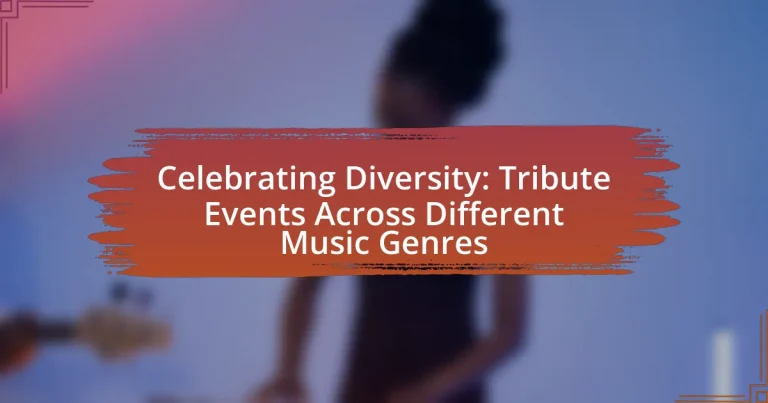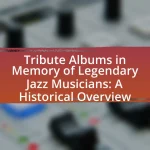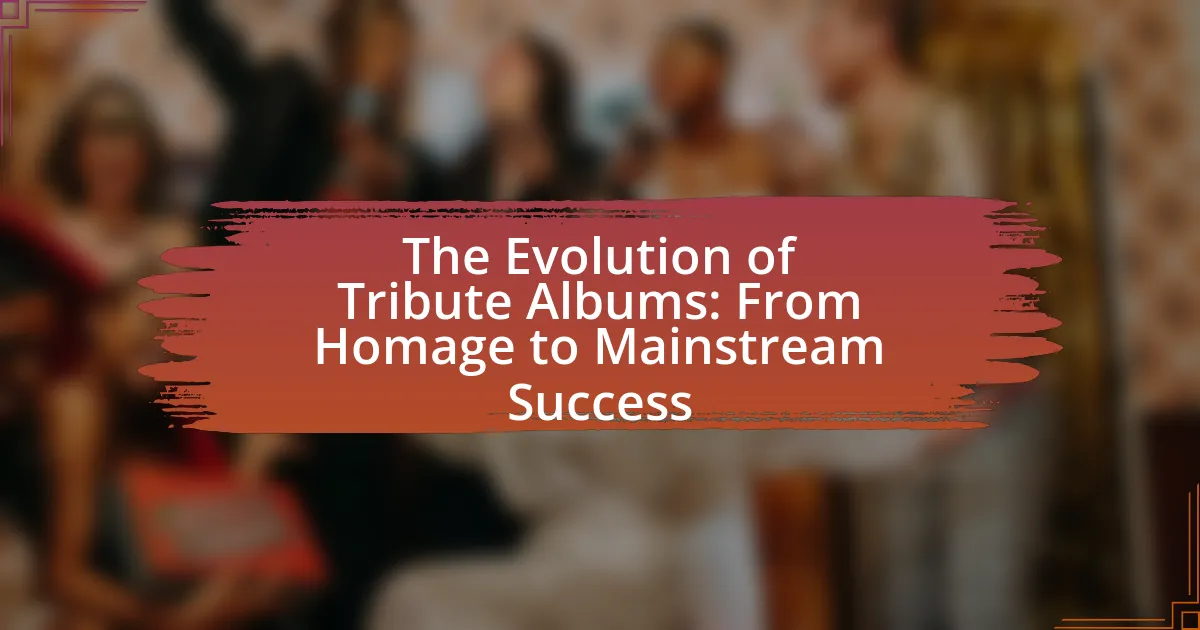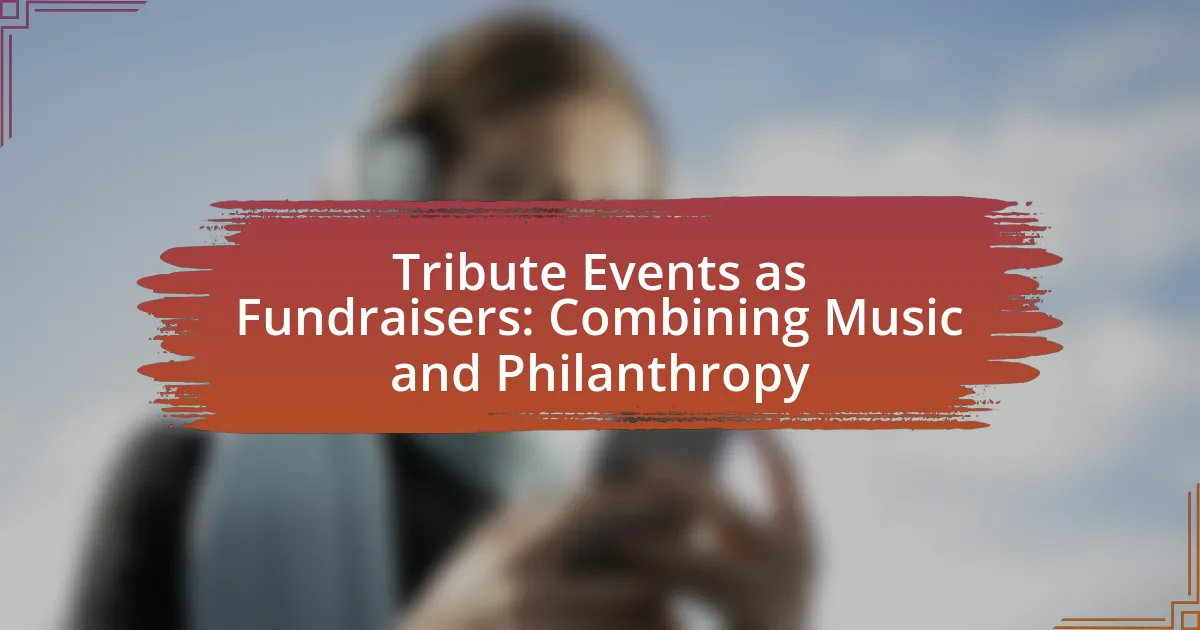Tribute events are organized performances that honor specific artists, genres, or cultural movements, playing a vital role in celebrating diversity through music. These events showcase a variety of musical styles and influences, fostering community engagement and cultural appreciation by bringing together performers from diverse backgrounds. The article explores how tribute events reflect cultural diversity, promote inclusivity across music genres, and contribute to the preservation of musical heritage. It also discusses the organization of these events, highlighting key steps, community partnerships, and the impact of technology on audience engagement. Additionally, it addresses the representation of various music genres and the challenges faced in promoting niche genres within the music industry.
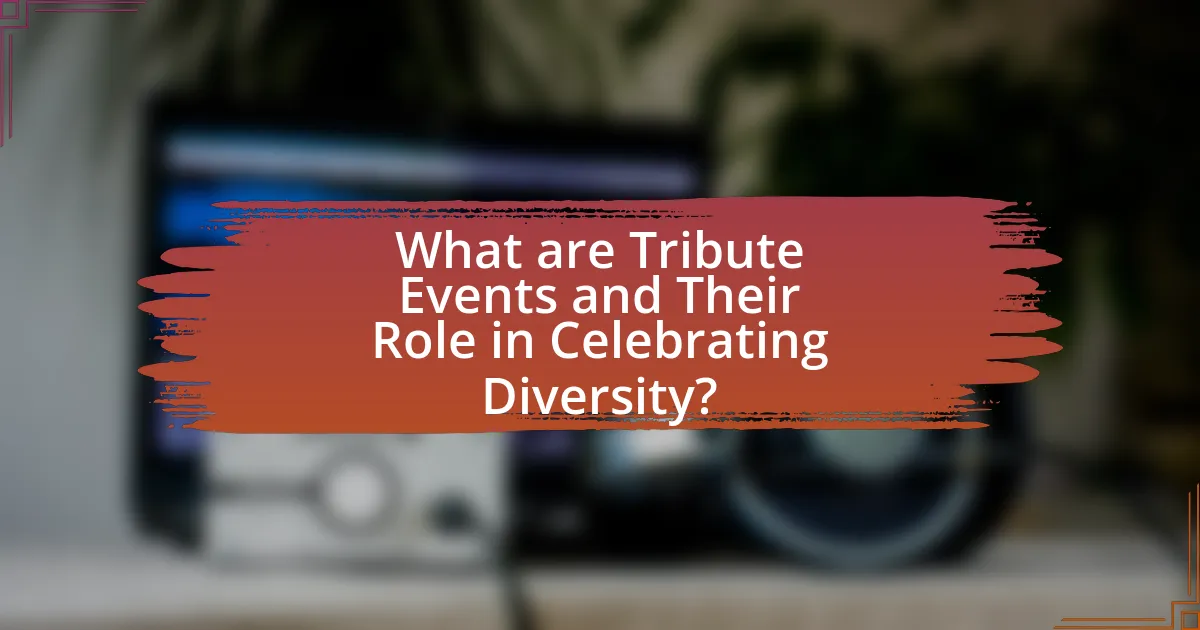
What are Tribute Events and Their Role in Celebrating Diversity?
Tribute events are organized performances that honor and celebrate the work of specific artists, genres, or cultural movements, often showcasing diverse musical styles and influences. These events play a crucial role in celebrating diversity by bringing together various communities, allowing for the expression of different cultural identities through music. For instance, tribute concerts often feature artists from multiple backgrounds, highlighting the interconnectedness of musical traditions and fostering appreciation for cultural differences. Research indicates that such events can enhance social cohesion and promote understanding among diverse groups, as they create a shared space for cultural exchange and dialogue.
How do tribute events reflect cultural diversity in music?
Tribute events reflect cultural diversity in music by showcasing a wide range of genres, styles, and cultural influences through performances that honor various artists and traditions. These events often feature musicians from different backgrounds, allowing audiences to experience and appreciate the rich tapestry of global music. For example, tribute concerts dedicated to artists like Bob Marley or Selena not only celebrate their contributions but also highlight the cultural contexts from which their music emerged, such as reggae and Tejano music. This blending of diverse musical elements fosters cross-cultural understanding and appreciation, demonstrating how tribute events serve as platforms for cultural exchange and recognition within the music community.
What are the key elements that make tribute events diverse?
The key elements that make tribute events diverse include the variety of musical genres represented, the cultural backgrounds of the performers, and the unique themes or concepts that each event embodies. Tribute events often showcase multiple genres, such as rock, pop, jazz, and classical, allowing for a broad spectrum of musical expression. Additionally, performers from different cultural backgrounds bring their own interpretations and styles, enriching the overall experience. For instance, a tribute to a rock band may feature artists from various ethnicities, each adding their cultural influences to the performance. Furthermore, the themes of tribute events can range from honoring specific artists to celebrating particular eras or movements in music, which further enhances their diversity. This multifaceted approach not only attracts a wider audience but also fosters an inclusive atmosphere that celebrates the richness of musical heritage.
How do tribute events promote inclusivity in music genres?
Tribute events promote inclusivity in music genres by bringing together diverse audiences to celebrate the works of various artists, regardless of their background or genre. These events often feature a mix of performers from different musical styles, allowing attendees to experience a wide range of cultural expressions. For example, tribute concerts for iconic artists like David Bowie or Aretha Franklin attract fans from various demographics, fostering a sense of community and shared appreciation for music. Additionally, tribute events often highlight underrepresented genres, providing a platform for artists who may not receive mainstream recognition, thus encouraging a broader acceptance of musical diversity.
Why are tribute events significant in the music industry?
Tribute events are significant in the music industry because they honor and celebrate the legacy of influential artists while fostering community engagement and cultural appreciation. These events provide a platform for emerging and established musicians to showcase their talents by performing the works of iconic figures, thereby keeping their music alive and relevant. For instance, events like the “The Concert for George,” held in 2002 to honor George Harrison, not only celebrated his contributions but also raised funds for charitable causes, demonstrating the dual impact of tribute events on both the music community and society at large.
What impact do tribute events have on artists and audiences?
Tribute events significantly impact both artists and audiences by fostering a sense of community and honoring musical legacies. For artists, these events provide opportunities for exposure, collaboration, and the chance to connect with fans through shared appreciation of influential musicians. For audiences, tribute events create a space for nostalgia and collective memory, allowing them to experience the music of their favorite artists in a live setting, often evoking strong emotional responses. Research indicates that tribute concerts can enhance the cultural landscape by promoting diversity in music genres and encouraging cross-genre appreciation, as seen in events that celebrate artists from various backgrounds and styles.
How do tribute events contribute to the preservation of musical heritage?
Tribute events contribute to the preservation of musical heritage by honoring and reviving the works of influential artists, thereby ensuring their music remains relevant and accessible to new generations. These events often feature performances that replicate the original style and spirit of the artists, which helps to educate audiences about the historical context and significance of the music. For example, tribute concerts for legendary musicians like Elvis Presley or Freddie Mercury not only celebrate their contributions but also introduce their music to younger audiences who may not be familiar with it. This active engagement fosters a cultural continuity that is essential for the preservation of musical traditions and influences.
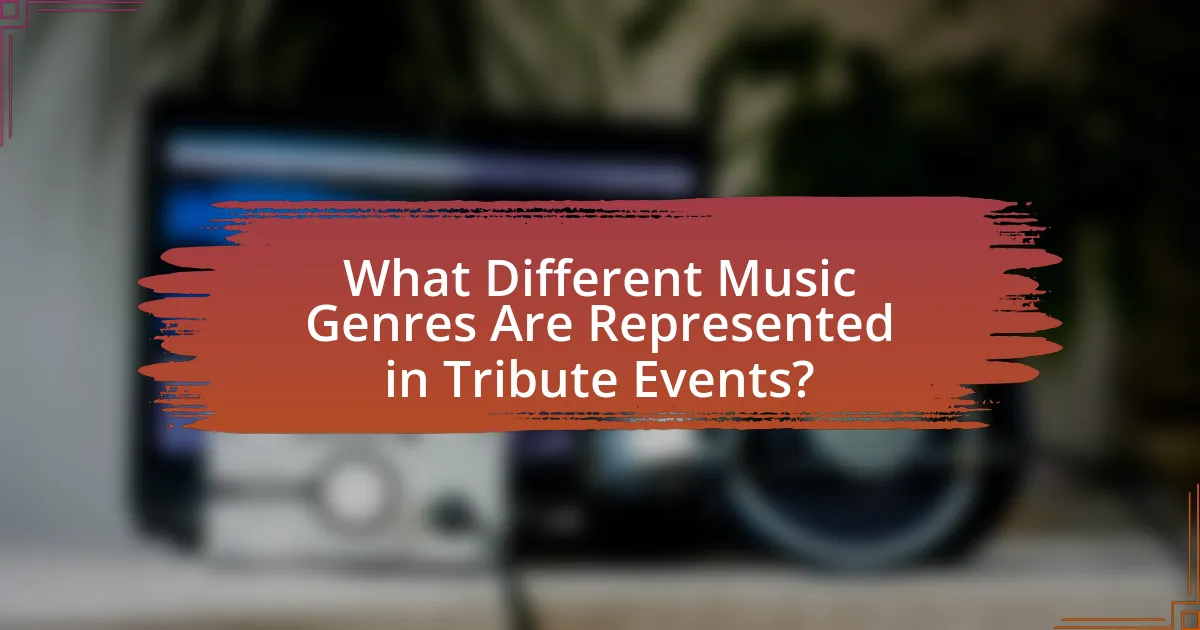
What Different Music Genres Are Represented in Tribute Events?
Tribute events represent a wide array of music genres, including rock, pop, country, jazz, hip-hop, and classical. These events often feature performances that honor iconic artists and their contributions to these genres, such as tribute bands for rock legends like Queen or pop stars like Michael Jackson. The diversity in genres allows tribute events to appeal to various audiences, showcasing the cultural significance and influence of different musical styles. For instance, the popularity of tribute festivals, such as the “Tribute Festival” in the UK, highlights the extensive representation of genres, drawing fans from multiple musical backgrounds.
How do tribute events vary across different music genres?
Tribute events vary significantly across different music genres in terms of style, audience engagement, and performance elements. For instance, rock tribute events often feature elaborate stage setups and high-energy performances that replicate the original band’s concerts, attracting a diverse audience that includes both dedicated fans and casual listeners. In contrast, classical music tribute events may focus on orchestral arrangements and formal attire, appealing to a more niche audience that appreciates the intricacies of the compositions. Additionally, tribute events in genres like country music often emphasize storytelling and community, fostering a more intimate atmosphere where audience participation is encouraged. These variations reflect the unique cultural and social contexts of each genre, influencing how tribute events are organized and experienced.
What are some notable tribute events in rock music?
Notable tribute events in rock music include the “Concert for George,” held in 2002 to honor George Harrison, featuring artists like Eric Clapton and Paul McCartney. Another significant event is the “The Night the Buzzard Ate Billy,” a tribute to the late Billy Joe Shaver, which showcased various artists performing his songs. Additionally, “The Freddie Mercury Tribute Concert for AIDS Awareness,” held in 1992, featured performances by major rock acts such as Metallica and David Bowie, raising funds for AIDS research. These events not only celebrate the legacies of influential rock musicians but also unite fans and artists in remembrance and support of important causes.
Which tribute events highlight diversity in hip-hop culture?
Tribute events that highlight diversity in hip-hop culture include the “Hip-Hop Honors” and “The BET Hip Hop Awards.” These events celebrate the contributions of various artists from different backgrounds, showcasing the genre’s rich tapestry. For instance, “Hip-Hop Honors” specifically recognizes influential figures from diverse communities, while “The BET Hip Hop Awards” features performances and awards that reflect the multicultural nature of hip-hop, including artists from various ethnicities and regions. These events serve as platforms to acknowledge and promote the inclusivity inherent in hip-hop culture.
What genres are often overlooked in tribute events?
Genres often overlooked in tribute events include jazz, country, and world music. Jazz, despite its rich history and influence on various music styles, frequently lacks dedicated tribute events, limiting recognition of its iconic artists. Country music, while popular, often sees fewer tribute events compared to rock and pop, which dominate the scene. Additionally, world music genres, such as Afrobeat and reggae, are often underrepresented, missing opportunities to celebrate their cultural significance and contributions to the global music landscape.
How can tribute events be expanded to include more genres?
Tribute events can be expanded to include more genres by diversifying the selection of artists and incorporating various musical styles into the programming. This approach allows organizers to attract a broader audience and celebrate the richness of different musical traditions. For instance, including tribute performances for genres such as jazz, country, hip-hop, and electronic music alongside traditional rock and pop tributes can enhance the event’s appeal. Historical examples, such as the emergence of multi-genre festivals like Coachella, demonstrate that diverse lineups can significantly increase attendance and engagement, showcasing the viability of this strategy.
What are the challenges faced in representing niche genres?
Representing niche genres presents challenges such as limited audience reach, which can hinder marketing efforts and financial viability. Niche genres often attract smaller, dedicated fan bases, making it difficult to generate significant revenue compared to mainstream genres. Additionally, there is a lack of media coverage and promotional support for these genres, resulting in reduced visibility and recognition. Furthermore, the specialized nature of niche genres can lead to misunderstandings or misinterpretations by broader audiences, complicating efforts to accurately represent the genre’s essence. These factors collectively contribute to the difficulties in effectively promoting and celebrating niche genres within the music industry.
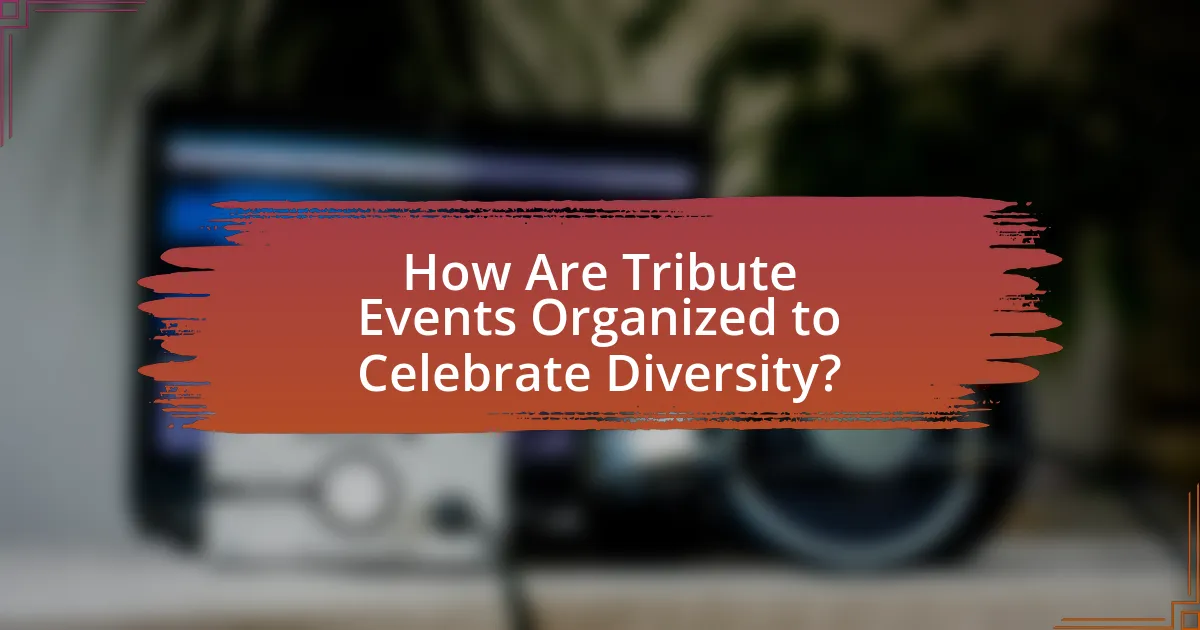
How Are Tribute Events Organized to Celebrate Diversity?
Tribute events celebrating diversity are organized by bringing together artists and communities to honor various cultural heritages through music and performance. These events typically involve collaboration among diverse stakeholders, including local organizations, cultural groups, and artists representing different backgrounds. For instance, events may feature a lineup of musicians from various genres, showcasing their unique cultural influences, which fosters an inclusive atmosphere.
Additionally, the planning process often includes community input to ensure representation and relevance, as seen in events like the “GlobalFest” in New York City, which highlights international artists and promotes cross-cultural dialogue. Such initiatives not only celebrate diversity but also educate audiences about different cultures, reinforcing the importance of inclusivity in the arts.
What are the key steps in planning a diverse tribute event?
The key steps in planning a diverse tribute event include defining the event’s purpose, selecting a diverse lineup of performers, securing an inclusive venue, promoting the event to a wide audience, and ensuring accessibility for all attendees. Defining the event’s purpose establishes the theme and goals, while selecting a diverse lineup ensures representation across different music genres and cultures. Securing an inclusive venue accommodates various needs, and promoting the event widely helps attract a diverse audience. Ensuring accessibility, such as providing accommodations for individuals with disabilities, is crucial for inclusivity. These steps collectively contribute to a successful and meaningful tribute event that celebrates diversity in music.
How do organizers select artists and genres for tribute events?
Organizers select artists and genres for tribute events based on factors such as audience preferences, the cultural significance of the original artists, and the relevance of the genres to the event’s theme. They often conduct market research to understand which artists resonate with their target demographic, ensuring that the chosen acts can attract attendees and create a meaningful experience. Additionally, organizers may consider the historical impact of the original artists and their music, as well as the availability and performance capabilities of potential tribute artists. This strategic selection process helps to create an engaging and authentic tribute that honors the original music while appealing to diverse audiences.
What role do community partnerships play in organizing these events?
Community partnerships are essential in organizing tribute events across different music genres as they provide resources, local knowledge, and a network of support. These collaborations enhance event planning by leveraging the strengths of various stakeholders, such as local businesses, cultural organizations, and community leaders, which can lead to increased attendance and engagement. For instance, partnerships with local businesses can offer sponsorships or in-kind donations, while cultural organizations can help in promoting the event to diverse audiences, ensuring representation and inclusivity. This collaborative approach not only enriches the event experience but also fosters a sense of community ownership and pride, ultimately contributing to the celebration of diversity in music.
How can technology enhance the experience of tribute events?
Technology can enhance the experience of tribute events by providing immersive audio-visual elements and facilitating broader audience engagement. For instance, high-definition video screens can display live performances and tributes, allowing attendees to feel more connected to the artists being honored. Additionally, streaming services enable remote participation, expanding the audience beyond physical limitations. According to a report by Eventbrite, 70% of event organizers believe that technology improves attendee engagement, demonstrating its effectiveness in creating memorable experiences. Furthermore, social media platforms allow for real-time sharing and interaction, fostering a sense of community among fans of different music genres.
What digital platforms are used to promote tribute events?
Digital platforms commonly used to promote tribute events include social media networks, event listing websites, and email marketing services. Social media platforms like Facebook, Instagram, and Twitter allow event organizers to reach a broad audience through targeted ads and organic posts. Event listing websites such as Eventbrite and Meetup provide dedicated spaces for promoting specific events, enabling users to discover and RSVP easily. Email marketing services like Mailchimp facilitate direct communication with potential attendees, allowing for personalized outreach and updates. These platforms collectively enhance visibility and engagement for tribute events, making it easier for fans to connect with the performances they love.
How does social media influence audience engagement in tribute events?
Social media significantly enhances audience engagement in tribute events by facilitating real-time interaction and community building. Platforms like Facebook, Instagram, and Twitter allow attendees to share their experiences, post photos, and comment on performances, creating a sense of belonging and shared excitement. According to a study by the Pew Research Center, 69% of adults in the U.S. use social media, which indicates a broad audience reach and potential for engagement. Additionally, social media campaigns can generate buzz before the event, leading to increased attendance and participation. For instance, hashtags related to tribute events can trend, amplifying visibility and encouraging more fans to engage both online and offline.
What are some best practices for hosting inclusive tribute events?
To host inclusive tribute events, organizers should prioritize accessibility, representation, and community engagement. Ensuring venues are physically accessible for individuals with disabilities is crucial, as studies show that 1 in 4 adults in the U.S. have some form of disability. Additionally, featuring diverse artists and honoring a wide range of musical genres fosters a sense of belonging among attendees. Engaging with local communities to gather input on event planning can enhance relevance and inclusivity, as community-driven initiatives often lead to higher participation rates. These practices not only create a welcoming atmosphere but also reflect the diverse cultural landscape, making the event more meaningful and impactful.
How can event organizers ensure representation of diverse communities?
Event organizers can ensure representation of diverse communities by actively engaging with various cultural groups during the planning process. This involves consulting with community leaders and representatives to understand their needs and preferences, which can lead to a more inclusive event. For instance, a study by the National Endowment for the Arts highlights that events featuring diverse artists and cultural expressions attract broader audiences and foster community engagement. By incorporating diverse programming, such as music genres from different cultures, organizers can create an environment that celebrates inclusivity and reflects the community’s demographics.
What strategies can be employed to attract a diverse audience?
To attract a diverse audience, event organizers should implement inclusive programming that reflects various cultural backgrounds and musical genres. This can be achieved by curating a lineup that features artists from different ethnicities, genres, and backgrounds, ensuring representation across the board. For instance, a study by the National Endowment for the Arts found that diverse programming increases attendance and engagement, as audiences are more likely to participate when they see their culture represented. Additionally, utilizing targeted marketing strategies that reach different demographic groups through social media, community partnerships, and multilingual promotional materials can further enhance outreach efforts.
